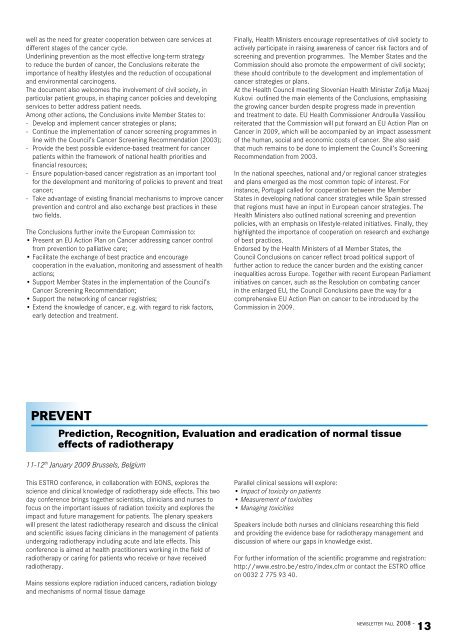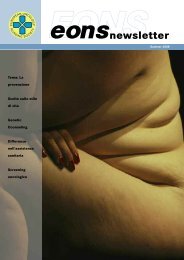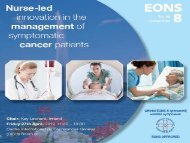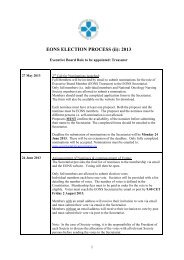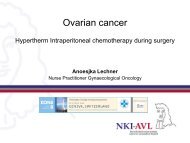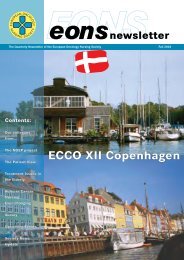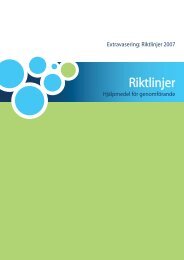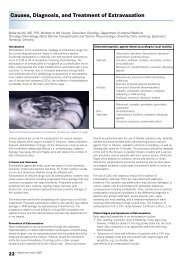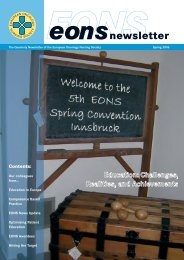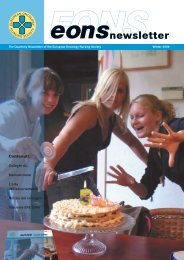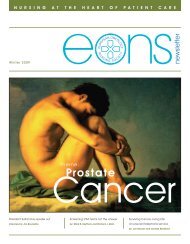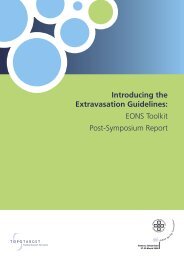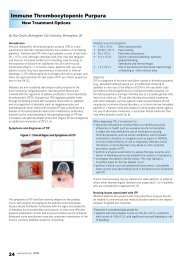English - the European Oncology Nursing Society
English - the European Oncology Nursing Society
English - the European Oncology Nursing Society
- No tags were found...
Create successful ePaper yourself
Turn your PDF publications into a flip-book with our unique Google optimized e-Paper software.
well as <strong>the</strong> need for greater cooperation between care services atdifferent stages of <strong>the</strong> cancer cycle.Underlining prevention as <strong>the</strong> most effective long-term strategyto reduce <strong>the</strong> burden of cancer, <strong>the</strong> Conclusions reiterate <strong>the</strong>importance of healthy lifestyles and <strong>the</strong> reduction of occupationaland environmental carcinogens.The document also welcomes <strong>the</strong> involvement of civil society, inparticular patient groups, in shaping cancer policies and developingservices to better address patient needs.Among o<strong>the</strong>r actions, <strong>the</strong> Conclusions invite Member States to:- Develop and implement cancer strategies or plans;- Continue <strong>the</strong> implementation of cancer screening programmes inline with <strong>the</strong> Council’s Cancer Screening Recommendation (2003);- Provide <strong>the</strong> best possible evidence-based treatment for cancerpatients within <strong>the</strong> framework of national health priorities andfinancial resources;- Ensure population-based cancer registration as an important toolfor <strong>the</strong> development and monitoring of policies to prevent and treatcancer;- Take advantage of existing financial mechanisms to improve cancerprevention and control and also exchange best practices in <strong>the</strong>setwo fields.The Conclusions fur<strong>the</strong>r invite <strong>the</strong> <strong>European</strong> Commission to:• Present an EU Action Plan on Cancer addressing cancer controlfrom prevention to palliative care;• Facilitate <strong>the</strong> exchange of best practice and encouragecooperation in <strong>the</strong> evaluation, monitoring and assessment of healthactions;• Support Member States in <strong>the</strong> implementation of <strong>the</strong> Council’sCancer Screening Recommendation;• Support <strong>the</strong> networking of cancer registries;• Extend <strong>the</strong> knowledge of cancer, e.g. with regard to risk factors,early detection and treatment.Finally, Health Ministers encourage representatives of civil society toactively participate in raising awareness of cancer risk factors and ofscreening and prevention programmes. The Member States and <strong>the</strong>Commission should also promote <strong>the</strong> empowerment of civil society;<strong>the</strong>se should contribute to <strong>the</strong> development and implementation ofcancer strategies or plans.At <strong>the</strong> Health Council meeting Slovenian Health Minister Zofija MazejKukovič outlined <strong>the</strong> main elements of <strong>the</strong> Conclusions, emphasising<strong>the</strong> growing cancer burden despite progress made in preventionand treatment to date. EU Health Commissioner Androulla Vassilioureiterated that <strong>the</strong> Commission will put forward an EU Action Plan onCancer in 2009, which will be accompanied by an impact assessmentof <strong>the</strong> human, social and economic costs of cancer. She also saidthat much remains to be done to implement <strong>the</strong> Council’s ScreeningRecommendation from 2003.In <strong>the</strong> national speeches, national and/or regional cancer strategiesand plans emerged as <strong>the</strong> most common topic of interest. Forinstance, Portugal called for cooperation between <strong>the</strong> MemberStates in developing national cancer strategies while Spain stressedthat regions must have an input in <strong>European</strong> cancer strategies. TheHealth Ministers also outlined national screening and preventionpolicies, with an emphasis on lifestyle-related initiatives. Finally, <strong>the</strong>yhighlighted <strong>the</strong> importance of cooperation on research and exchangeof best practices.Endorsed by <strong>the</strong> Health Ministers of all Member States, <strong>the</strong>Council Conclusions on cancer reflect broad political support offur<strong>the</strong>r action to reduce <strong>the</strong> cancer burden and <strong>the</strong> existing cancerinequalities across Europe. Toge<strong>the</strong>r with recent <strong>European</strong> Parliamentinitiatives on cancer, such as <strong>the</strong> Resolution on combating cancerin <strong>the</strong> enlarged EU, <strong>the</strong> Council Conclusions pave <strong>the</strong> way for acomprehensive EU Action Plan on cancer to be introduced by <strong>the</strong>Commission in 2009.PREVENTPrediction, Recognition, Evaluation and eradication of normal tissueeffects of radio<strong>the</strong>rapy11-12 th January 2009 Brussels, BelgiumThis ESTRO conference, in collaboration with EONS, explores <strong>the</strong>science and clinical knowledge of radio<strong>the</strong>rapy side effects. This twoday conference brings toge<strong>the</strong>r scientists, clinicians and nurses tofocus on <strong>the</strong> important issues of radiation toxicity and explores <strong>the</strong>impact and future management for patients. The plenary speakerswill present <strong>the</strong> latest radio<strong>the</strong>rapy research and discuss <strong>the</strong> clinicaland scientific issues facing clinicians in <strong>the</strong> management of patientsundergoing radio<strong>the</strong>rapy including acute and late effects. Thisconference is aimed at health practitioners working in <strong>the</strong> field ofradio<strong>the</strong>rapy or caring for patients who receive or have receivedradio<strong>the</strong>rapy.Mains sessions explore radiation induced cancers, radiation biologyand mechanisms of normal tissue damageParallel clinical sessions will explore:• Impact of toxicity on patients• Measurement of toxicities• Managing toxicitiesSpeakers include both nurses and clinicians researching this fieldand providing <strong>the</strong> evidence base for radio<strong>the</strong>rapy management anddiscussion of where our gaps in knowledge exist.For fur<strong>the</strong>r information of <strong>the</strong> scientific programme and registration:http://www.estro.be/estro/index.cfm or contact <strong>the</strong> ESTRO officeon 0032 2 775 93 40.newsletter fall 2008 -13


